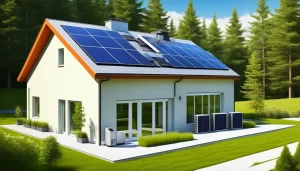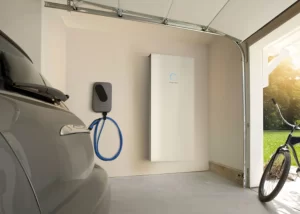Enhancing BESS Performance: The Application and Advantages of Liquid Cooling Technology in Battery Energy Storage Systems
Introduction: The Importance of Liquid Cooling Technology
In the realm of modern energy management, liquid cooling technology is becoming an essential component in Battery Energy Storage Systems (BESS). With the rapid development of renewable energy, especially wind and solar power, there is an increasing demand for efficient and reliable thermal management systems. Liquid cooling systems, as an advanced thermal management solution, provide significant performance improvements for BESS. Due to the superior thermal conductivity of liquids, they efficiently manage the heat generated in energy storage containers, optimizing system reliability and safety. This article delves into the basic principles of liquid cooling technology and its key advantages in BESS, offering insights into future technological trends.
Overview of Liquid Cooling Technology
Liquid cooling technology employs liquids as heat transfer media to achieve effective thermal management. Compared to air cooling, liquids have higher thermal conductivity and specific heat capacity, making liquid cooling systems more efficient in heat dissipation. Liquid cooling systems are primarily divided into two types:
Passive Liquid Cooling Systems: These systems use liquid to exchange heat with the external air. Passive liquid cooling systems have a simpler structure and are suited for lower thermal loads.
Active Liquid Cooling Systems: By utilizing liquid-to-liquid heat exchange, active liquid cooling systems can more actively control battery temperatures and are often combined with vehicle air conditioning or refrigeration systems, making them suitable for high thermal loads.

The operational mechanism of liquid cooling systems ensures effective battery thermal management, maintaining stable temperatures for BESS under various operating conditions.
Key Advantages of Liquid Cooling Technology for BESS
- Extended Battery Life
Liquid cooling technology keeps batteries operating at cooler, stable temperatures, which effectively prolongs their lifespan. Lower temperatures slow down battery aging and reduce the risk of failures, thereby lowering maintenance costs and replacement frequency.
- Enhanced Efficiency
With the support of liquid cooling systems, batteries operate within optimal temperature ranges, improving overall efficiency. This not only enhances energy output but also reduces operational costs, making BESS more economical over the long term.
- Increased Safety
Liquid cooling systems prevent thermal runaway and reduce fire risks by controlling battery temperatures. This enhances the safety of BESS containers, providing a more reliable storage solution.
- Flexibility and Customization
Liquid cooling systems can be designed and adjusted to meet different application needs, offering great flexibility and customization. Whether in direct contact or through indirect methods, liquid cooling systems can adapt to various scenarios and specific thermal management requirements.
Applications of Liquid Cooling Systems
- Modern BESS Container Applications
The application of liquid cooling technology in contemporary BESS containers improves the efficiency of large-scale energy storage. For example, liquid cooling systems effectively manage battery temperatures in high-temperature environments, enhancing the reliability and safety of storage systems.
- Successful Case Studies
Several successful implementations of liquid cooling technology demonstrate its concrete benefits. In large-scale renewable energy projects, the use of liquid cooling systems has significantly improved battery thermal management and optimized energy storage.
Future Trends and Developments
As technology continues to advance, the prospects for liquid cooling systems in battery energy storage are promising. Future developments will focus on increasing thermal management efficiency and reducing costs. Further advancements in liquid cooling technology will drive progress in energy storage solutions and support broader applications of renewable energy.
Conclusion
Liquid cooling technology significantly enhances BESS performance by extending battery life, improving efficiency, and increasing safety. Continued research and innovation in liquid cooling systems will further optimize battery storage systems, providing more efficient and reliable solutions for future energy storage and management. Encouraging technological advancements in this field will contribute to a sustainable energy future globally.
Contact us
- Email:[email protected]
- Tel: +86 13651638099
- Address: 333 Fengcun Road, Fengxian District, Shanghai
Get A Quote Now!
Related product links are available directly
Site storage products:Site storage products 归档 – (energystoragecontainer.com)
Lithium Battery:Lithium Battery 归档 – (energystoragecontainer.com)
Read more

How to Choose Outdoor Mobile Power Supply Correctly?
Outdoor portable power stations are indispensable for camping, road trips, and emergencies, ensuring a reliable energy source for devices and appliances.

Solar Revolution: How Home Systems Can Light Up Ecuador’s Energy Future
Ecuador’s energy crisis, driven by its worst drought in 61 years, has revealed the vulnerabilities of a hydropower-dependent energy system. With water levels at hydropower stations plummeting and energy shortages reaching 1080 megawatts, the nation faces significant economic and social challenges.

Lighting up the Future: How Home Inverter Energy Storage Illuminates Ecuador’s Energy Darkness
Ecuador is facing a severe electricity crisis, driven by historic drought conditions that have crippled the nation’s hydroelectric capacity, which accounts for over 70% of its energy supply.

New Power of Smart Home: Three Major Life Improvement Advantages of Photovoltaic Energy Storage System
With the rapid adoption of solar battery storage technology, the concept of a whole house intelligent photovoltaic energy storage system is becoming increasingly relevant in modern households.
